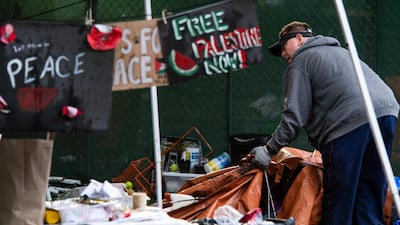Police arrested dozens of pro-Palestine demonstrators while breaking up protest camps at the Massachusetts Institute of Technology and University of Pennsylvania on Friday, as crackdowns on campus protests against the Israel-Gaza war continue.
Campus newspaper The Daily Pennsylvanian reported that Penn campus officers in riot gear and Philadelphia city police cleared the camp of more than 40 tents in a predawn raid, throwing signs, flags and other items into bin lorries.
Penn's public safety department said about 33 people were arrested on suspicion of “defiant trespass”.
MIT campus publication The Tech reported that riot police were sent to the Cambridge campus outside Boston to arrest protesters and tear down the tent camp.
University president Sally Kornbluth said 10 people had been taken into police custody as part of the administration's “last resort” after weeks of trying to negotiate with organisers.
“The escalation of the last few days, involving outside threats from individuals and groups from both sides, has been a tipping point,” she wrote in a statement. “It was not heading in a direction anyone could call peaceful.”
The two raids were the latest operations against anti-war camps consisting of students calling for their schools to disclose finances and divest from companies or academic institutions connected to Israel's actions in the occupied territories.
The Appeal reports there have been more than 2,900 arrests at more than 100 campuses across the US.
The nationwide movement began in April at Columbia University, where mass arrests took place at the campus protest camp.
Graduation events are also beginning nationwide, increasing pressure for divestment agreements and opening opportunities for anti-war protests.
Before the movement began, the University of Southern California cancelled a speech by the valedictorian at the annual commencement ceremony.
Asna Tabassum, a Muslim biomedical engineering major with a minor in genocide studies, was told by USC that she would not be able to speak because of alleged safety concerns.
On Friday, Ms Tabassum published what would have been her commencement speech through campus newspaper The Daily Trojan, showing the redacted text.
“It is my honour to stand before you today as your valedictorian. I am filled with gratitude to have the privilege of – " the text reads before several blacked-out lines appear.
The cancellation of her speech, reportedly spurred by a series of pro-Palestinian social media posts viewed by some student groups as anti-Semitic, sparked widespread criticism and protests.
USC later cancelled its main commencement event and pulled speakers, instead focusing on smaller college graduation events. Other universities have either cancelled or adjusted end-of-year events.
Ms Tabassum received a loud and lengthy standing ovation at a USC student awards ceremony on Thursday.
Meanwhile, on Thursday, Cornell University's president announced her retirement – adding to a string of departures by leaders of American universities since campus tension grew following the October 7 Hamas attack against Israel and Israel's response in Gaza.
“I began deliberating about this last fall, and made the decision over the December break; but three times, as I was ready to act on it, I had to pause because of events on our and/or on other campuses,” Martha Pollack wrote in a statement.
“There is so much more to Cornell than the current turmoil taking place at universities across the country right now, and I hope we do not lose sight of that.”
Also on Thursday, a New York City college connected to Columbia, the Union Theological Seminary, announced that it would support student calls for divestment.
The board of trustees said in a statement that it had decided “to withdraw support from companies profiting from the war” in Palestine, formalising a decision it has been researching and working on since November last year.


